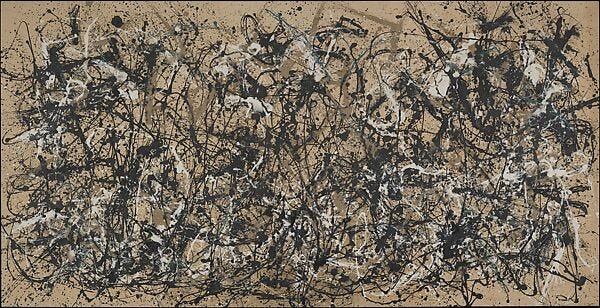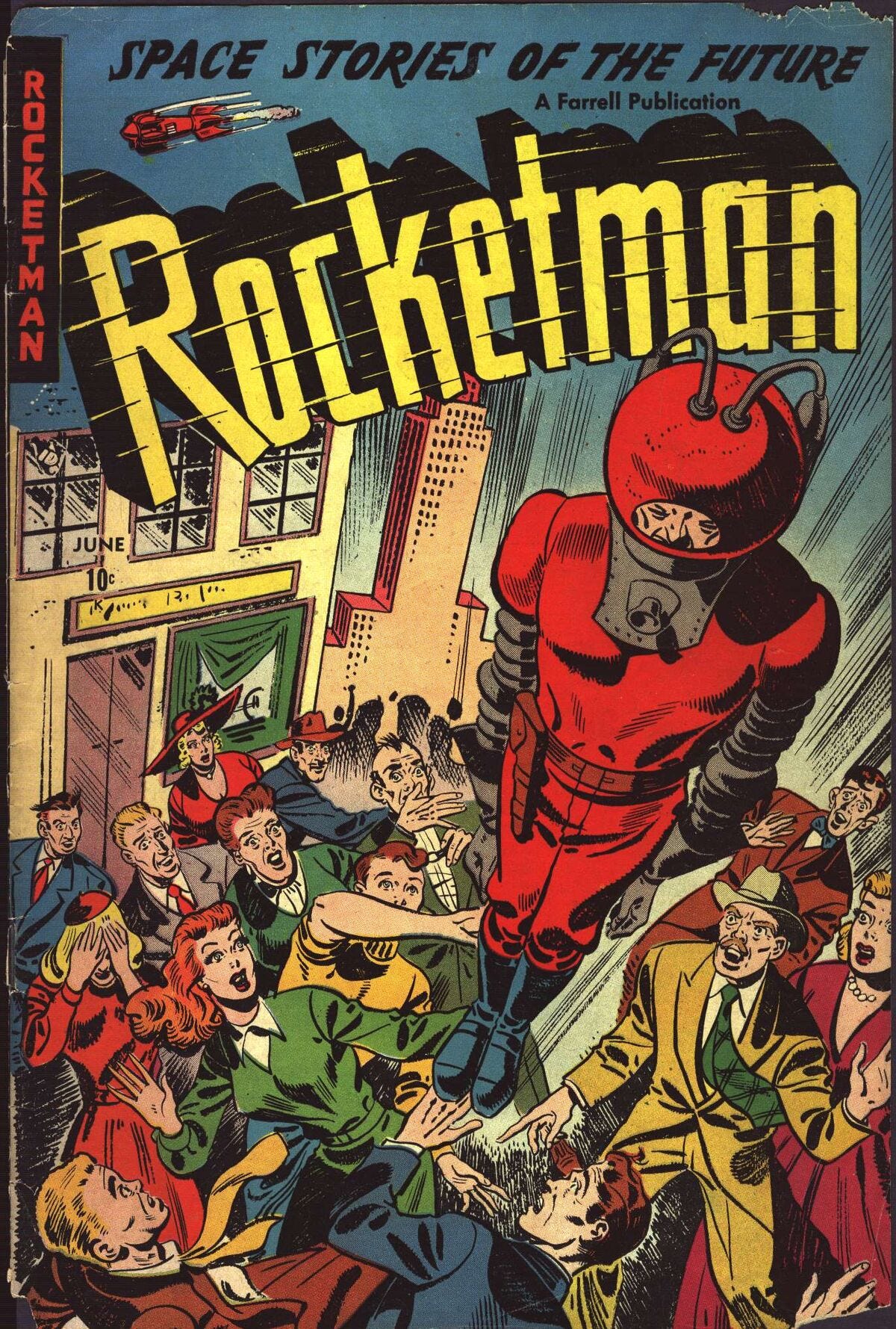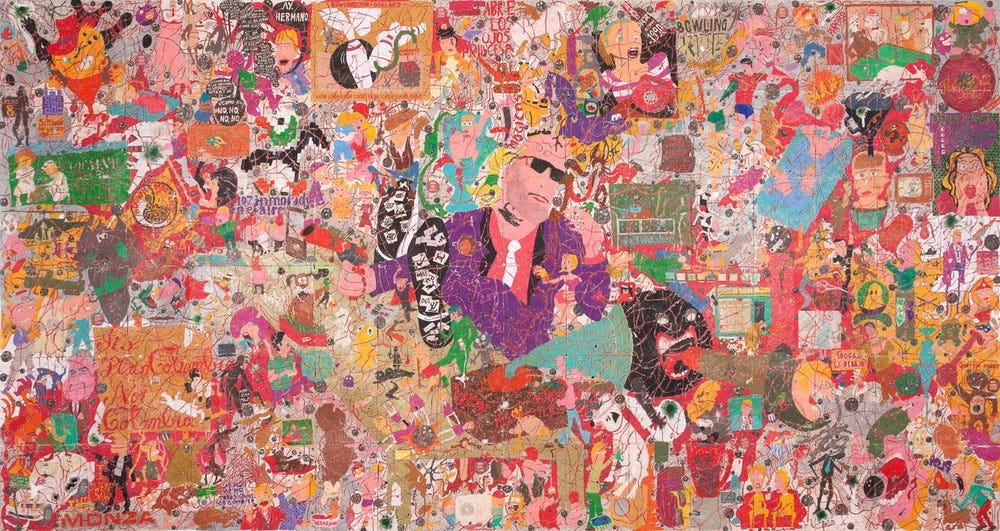Gravity's Rainbow - Part 3 - Chapter 6: A Hero or a Weapon
Analysis of Gravity's Rainbow, Part 3 - Chapter 6: Slothrop Sick, His Past Meeting with Enzian, Meeting Säure and His Girls, Pig Bodine, His Next Journey
Slothrop, now a few weeks in Berlin post-hot-air-balloon-fight, has gotten sick from drinking the water before boiling it first. Typical American that he is, he immediately thinks he knows best and contemplates warning the Berliners of the poisonous nature of the tulip bulb which they mix into their boiled water. But here he is now, sitting in a cellar, vomiting and shitting uncontrollably, calling for his mother Nalline, and hallucinating that which is his worst fear — the prowling white Rolls Royces and the sounds of bootsteps outside the halls. He contemplates begging an “American work detail marching down the street […] to take him back, requesting political asylum in America,” (360) but of course, with all the stomach cramps and involuntary fluid movements, he is unable to even accomplish that task. And so, his America, his own being, is drawn further away once again. Perhaps someone else out there can save him. Quite a welcome to Berlin.
Enzian is the first person who comes to mind when Slothrop ponders on who else could save him, and this leads him to remember the last time he actually saw Enzian (for, it appears that Slothrop’s entire adventure in Nordhausen was not told to us, and now we travel back to his pre-Berlin adventures). He came across the Schwarzkommando scavenging for rocket parts which is their self-given job out here in the Zone (3.3). Oddly, the Africans wear the uniforms of those who wronged them, highlighting the literal and semantic drift of blackness (Schwarzgerät, Schwarzvater, Schwarznabe, and both the real — Enzian’s group — and fake — Operation Blackwing — Schwarzkommando). The same thing is now occurring with “old Wermacht and SS uniforms” (361). Their meaning is already fading and their place in the world is set as just another thing that happened — another evil that we (supposedly) stopped. As these evils fade into normalcy; long held festivals filled with the country’s mythos will soon be replaced by those regarding Gravity and those who have gained control over it.
On top of this, Enzian and his crew wear an insignia representing the five stages of the V-2 rocket launch placed in a symbol modeled after the same that was worn by Germans who came to Südwest. The Zone Herero are literally taking on the identity of their oppressors, wearing their uniforms, their insignia, and letters that bear the initial phases of the weapon which was used in attempt to kill whoever would stand in their way — or even whoever happened to be in the vicinity. The Schwarzkommando are not taking on this identity in the sense of the evil these symbols perpetrated, but in a sense of reclamation and retribution.
He told Slothrop — who he still knows as Ian Scuffling — that many people did not know the Schwarzkommando even existed, let alone were so close to them. But it is not just the others who ponder the Herero’s existence, it is the Herero themselves as well. For, like the Dodo bird, they were senselessly and purposelessly slaughtered by a colonizing force only seeking to destroy what it did not know. The Germans came onto their land, slaughtered, and eventually left, leaving behind the survivors. Imagine the Dodos, families killed, left with no sense of community, survivors uprooted and thrown into some foreign land that is also ravished by war. This loss of a sense of place would lead anyone or anything to question whether they exist anymore, at least in the sense that they once did.
Slothrop is told that the Zone Herero “have a word that [they] whisper, a mantra for times that threaten to be bad. Mba-kayere. […] It means ‘I am passed over’” (362). For this specific group was passed over — somehow spared in the horrid genocide of their people, left as the sole carrier of their stories and myths, now in a land that cared nothing for them. They feel like a number or statistic because everything that had once made them up, as a people, now has been obliterated from history, only living in their minds as a past they once had. But here, they truly are just numbers — a group living in the tunnels beneath a mountain, something like the plots on Slothrop’s or Mexico’s map, that must be destroyed.
This is why the Zone Herero have found such deep connection with the Rocket itself. It, like them, has a tenuous place in this world. The Herero are holding on by mere threads — those threads being the final passed over remnants scattered across the surface of the world. Similarly, the Rocket’s place in this world is only maintained by mathematics and sciences that should barely be accessible, thus rendering the rocket’s function to something that needs near perfect conditions to properly survive. Both the Herero and the Rocket survive “at the mercy of small things,” (362) subject to dust, minor corrosion, rain. The Rocket’s survival ultimately leads to its own suicide, just as this final grasp at life for the Herero will ultimately lead to the same. It is the Destiny of both to momentarily survive by a miracle and then die by their own hand.
Andreas Orukambe1 and Christian2, two Zone Herero with Enzian (3.3), are also digging up scattered rocket parts, looking specifically at the serial number at each rocket which they unearth. And here they find one, calling over their Nguarorerue — Enzian’s nickname meaning one who has been proven — who proceeds to curse at the numbers two and seven printed on the rocket, cuing Slothrop into the fact that the Zone Herero, too, are looking for the 00000 rocket — or as he calls it, both the Fünffachnullpunkt and the quintuple zero. But while Enzian does admit to Slothrop/Scuffling that this is what they are looking for, he also states, “‘I don’t believe there is one,’” (363) for just as the Schwarzkommando/Blackcommand do not exist on the radar of the majority, the Schwarzgerät/Blackinstrument might as well be nonexistent or undiscoverable, as well. Nonetheless, Slothrop and Enzian are searching for the undiscoverable device — the grail — and Slothrop also admits that he knows both Marvy and Tchitcherine are on the same search. Enzian realizes what this means. Marvy (the American), Tchitcherine (the Russian), and Slothrop (the Englishman, given Enzian knows him as Ian Scuffling), are all searching for the same device as him (the African). Or, to put it in other terms, the winning forces of the war, the Allies, are now teaming up, getting along just fine, in order to make life hell for those who never even asked to be a part of the war.
But, back in Berlin, Slothrop thinks of the Schwarzgerät and comes to the conjectures that it “is no Grail, Ace, that’s not what the G in Imipolex G stands for. And you are no knightly hero” (364). He compares himself and those who sought the Schwarzgerät/Grail to the Singing Nincompoop from a Wagner opera, Tannhäuser, who believed himself heroic and gallant for spending some nights with Venus, which ultimately led to his downfall and humiliation. And Slothrop will be running into his Lisaura3 soon, one Greta Erdmann.4 Erdmann waits for him in Neubabelsberg (New Babylon), the post-war German Hollywood, and this, the following events, are what lead to her and Slothrop’s meeting (though that meeting will not occur for a few more chapters).
As Slothrop, now recovered from his sickness, raided a vegetable patch in Berlin for food, he smells a . . . “no it can’t be yes it is it’s a REEFER!” (365). So Slothrop goes of searching for the marijuana and comes across the man who is smoking it, “the Weimar Republic’s most notorious cat burglar and doper,” (365) Emil “Säure” Bummer5, with two beautiful German women, Magda and Trudi. And, as Säure pulls out another reefer, it is revealed that Magda and Trudi raided Wagnerian opera costumes (coincidence?), leaving them with what would be Slothrop’s next new costume and identity. Both Slothrop and Säure have the same idea at the same time to change the outfit a bit — or as Slothrop likely thinks, not that he is wrong (though who knows by now), that Säure had the costume ready and was simply waiting for Slothrop, knowing he too would want to become this new identity. The horns of the helmet removed leave the shape of the rocket’s nose, and the other features modified create this new identity — Rocketman6. Thus, Slothrop has gone from himself (America) into the history of American hierarchy — from the bare-naked man running through a hotel, to a low-status member of the British army, a normal working man’s clothing, Ian Scuffling the war correspondent, to the Rocket itself. Before Slothrop can even don the outfit, Säure calls him Rocketman and asks for his assistance.
Slothrop’s paranoia (and, again, it is not truly paranoia, for Slothrop is well aware that there is something nefarious going at the world) leads him to question how Magda, lighting another reefer for him, could possess a luxury such as lipstick. Was Säure, knowing Slothrop was thinking of Rocketman, put here deliberately? Was Magda put here too? For, they are living out of an upturned truck. How could they possess weed, lipstick, and pop culture references that Slothrop realizes are exactly what he needed?
Through a bit of conversation, the group decides they need to move to the Chicago Bar, for Säure must speak to an unnamed American who is waiting there. So, they gather up the costume, each member wearing a part of Rocketman’s outfit, and make their way there, hallucinating from the vast amounts of reefer they have smoked as they walk. Slothrop specifically hallucinates (while also questioning the philosophical definition of what is is) the Reichstag building as King Kong taking a massive shit (which thematically is not too far off given, after the events of the novel occur, historically, the building would be turned into a modernist facility used merely for exhibitions which tourists and patrons could gawk at). Slothrop also sees rising loaves of raw dough for bread — God’s manna — littering the ground of downtown Berlin, though he soon realizes that this God given sustenance is merely the dead “human bodies, dug from beneath today’s rubble” (368). All that God-given life is transformed into God-given death — or, have we killed God, replaced him with the Rocket, and rendered his sustenance to something antithetical to what we were supposed to consume.
Somehow, they arrive at the Chicago, where army men and M.O.s don’t only consume alcohol, but pharmaceuticals. Here, a man plays a guitar and sings, “In 3/4 time and shit-kicking style,” (369) a song called The Doper’s Dream, recounting the dream of a man so high he dreamt of a jinni (Genie) who took him to Doperland. It was a place filled with dope, a mountain of hash, pharmaceutical pills, the Romilar River7, magic mushrooms, morning glories8, handfuls of cocaine, Panama Red marijuana, peyote, nutmeg tea, spiked brownies, and so on. The jinni brought him here by his wish and, as it turns out, the jinni was a narco — a police drug informant who entrapped the dreamer only to imprison him and lead to the country’s profit from his incarceration.
“The singer” of this song “is Seaman [Pig] Bodine, of the U.S. destroyer John E. Badass”9 (370). Bodine had recently arrived here from Potsdam, a city near Neubabelsberg which, while previously being home to trade in “Watches, wine, jewels, cameras, heroin, fur coats, [and] everything in the world,” (370) has now been completely changed. After being host to the Potsdam Conference — where Truman, Stalin, and Churchill, negotiated terms after the war in August of 1945, dividing Germany (here known as The Zone) into four different zones — it was taken over, just as the Doper’s Dream was, by security personnel, rendering it virtually impenetrable. Though, Bodine clearly needs someone to get back into Potsdam. He had left something there that needs to be collected. Säure asks, “‘what if Rocketman can” make it in? and Bodine responds with “‘That’s Rocketman?,’” (370) as if Rocketman had been a real, not a comic book, figure from the start.
Slothrop’s next adventure is thus put in motion: Bodine requests, though the request has enough stated benefits that it is intrinsically compulsory, that Slothrop infiltrates Potsdam and retrieves Bodine’s six kilograms “of pure, top-grade Nepalese hashish” (370). The benefits are an entire kilogram of the hashish (for Slothrop’s habit) and a million German Reichsmarks (which Slothrop desperately needs to survive his adventure). Though, this is just a bit too perfect for Slothrop, for he wonders how on Earth Bodine could get this vast sum of money. Things, as usual, are lining up perfectly for him; Bodine apparently can print this money which he proves by taking Slothrop, Säure, Greta, and Trudi back to his cellar where he really does have a jerry-rigged printing press that gets the Reichsmark pretty much perfect. And Slothrop, being hyped up and convinced that he really is a superhero, agrees to get the hashish in Potsdam, no matter how impossible the task may appear. He realizes, in later chapters, that he should have realized how They, once again, made the stars align to convince him to take on such an impossible task. But, for now, the possible gain is far too beneficial to give up. For the night, he sleeps with Magda, another girl in another Zone, and ponders on the riches that live within his future — if such a future exists.
Up Next: Part 3, Chapter 7
Thanks for reading as always! Question for all: I’ve been wondering if the comments still work on these posts since they’re initially paid but then become free? The transition between paid/free is weird on here, so I just thought I’d check!
The man listening to the radio in 3.3 (326-328) who hears another group of Zone Herero, leading Enzian to leave to find them.
Briefly mentioned in 3.3 (318) as he looked at blueprints with another Zone Herero named Mieczislav and who will be relevant again in a couple hundred pages, so just remember that he exists for now.
In the legend of Tannhäuser, who spent nights with Venus/Frau Holda, he returned home to sing of his escapades with her as a Minnesinger — a German lyricist — sending his lover, Lisaura, into a spiral, eventually leading to her death after the Pope denied Tannhäuser forgiveness for his sin.
Another name to not forget. Erdmann will be arriving soon and will be one of the most vital characters in Slothrop’s journey.
Säure, means “acid” and Bummer has obvious connotations. Thus, his name is in reference to a bad acid (LSD) trip.
Rocketman was a superhero in 1940s American comic books.
Which also happens to be a trademarked opiate.
A hallucinogen similar to, but far less potent than, LSD.
Seaman “Pig” Bodine is one of the main characters on Thomas Pynchon’s debut novel, V. (1963), and him and/or his family lineage appear in a number of Pynchon’s other novels, as well. (It’s been a minute since I read V., and I don’t particularly enjoy the book so I have never read it as closely as I should have despite having read it twice, so the connection between Bodine in that novel and this one is tenuous to me).







this part, wherein Rocketman is made, is so much fun. The edition I first had had a blurb from some newspaper on the cover that read, "Pynchon writes like an angel and clowns like the very devil." The clowning is world-class
Anybody have any leads what Rif means? Referring to REEFER, when Slothrop smells it in the garden: "Gunshot green of the Rif's slant fields here, vapor-blossoms resinous and summery, charm his snoot on through bushes and matted grass, under the blasted trees and whatever sits on their branches." Is Rif an acronym or shorthand for a place where they grow pot? Looked quickly, no leads.
I had to look up a few words:
dryads -- wood nymph
subdeb-sub-debutante, a younger girl who isn't at debutante age
more later peace
Slothrop's relative he pines for "wondering if he'll ever see Berkshire again. ... Nalline, the reflection from her Gold Star brightening her chins like a buttercup" Nalline is a brand name for the opioid Nalorphine